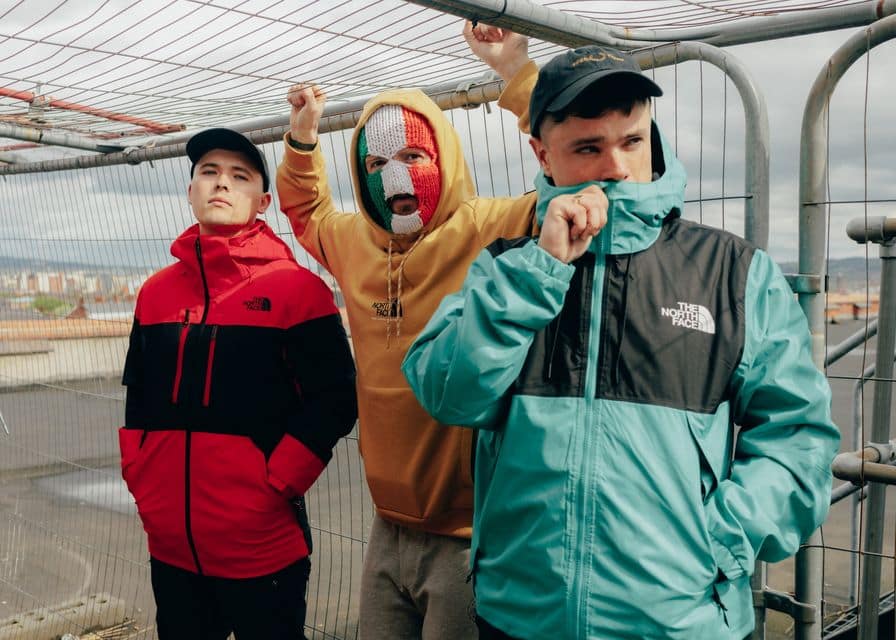




Wri/Dir: Rich Peppiatt | 105’
Kneecap begins with a montage of newsreel explosions, as a laconic and contradictory voiceover tells us that all films about Belfast start in the same way, but this one won’t. It’s clear from the off that this is one movie which will to use all means, fair or foul, to have its effect on the audience.
The film tells the story of the real-life rap group of the title, a trio from working-class West Belfast who play themselves in a drama which probably takes some liberties with the actuality but brims over with mischief, energy and inventiveness while making telling points about the Troubles and their repercussions down the generations.
In the 1990s, IRA man Arlo illicitly christens his son Móglaí Bap at a sacred Catholic rock in a wood outside Belfast. When British Army helicopters scope out the spot, Arlo becomes a marked man. He fakes his own death and goes into hiding, leaving his son in the care of a mother who promptly zonesout and retires to her sofa.
Bap and his friend Mo Chara grow up as self-confessed ‘low-life scum’. In theory the directionless duo are drug dealers,but their consumption levels are such that little is left for their customers. One of their few redeeming features is an enthusiasm for the Irish language, Gaeilge – or its slangy and idiosyncratic West Belfast variant.
A turning-point in their story comes when Mo is pulled in by police on suspicion of dealing. When he refuses to communicate in English, music teacher and Gaeilge evangelist J.J. Ó Dochartaigh is brought to the station to translate. Quickly falling into complicity with the suspicious youth, J.J. palms an as-yet-unnoticed blotter of acid and uses his position as intermediary to report the impenetrable curses Mo hurls at the peelers as a sober and watertight case. J.J. strikes up a friendship with the boys and encourages them to continue rapping in Gaeilge – in his view, “the light that guides us towards our freedom”.
Donning a woollen tricolour balaclava to hide his identity, J.J.steps in as producer, organiser and third member under the pseudonym “DJ Próvaí”. He also reverts to his youth as an enthusiastic drug-taker, which doesn’t sit so well with his girlfriend Caitlin.
Ó Dochartaigh does a good job in a role which requires a little more complexity than those of Mo and Bap, although they acquit themselves perfectly well. Conversely, Michael Fassbender’s brief incursions into the film as the mostly-absent Arlo bring a quasi-supernatural gravitas somewhat at odds with the generally harum-scarum tone.
Kneecap feels a bit like a hallucinatory take on the methods of French New Wave as the fourth wall is broken, the image paused and fast-forwarded, and striking visual effects and plasticine models mimic the drug states experienced by the band. Despite the cartoonishness and undercurrent of humour, though, the film gives us a sense of what it’s like to grown up in a violent and psychologically damaging place. Even if Mo and Bap see PTSD only as a useful pretext to claim prescription drugs, they probably are suffering from it. The music in the film demonstrates that Belfast Irish is a good fit for the rhythms of hip-hop, and we hear material steadily developing into its fiery and impressive current form as we watch the boys graduate from performing to a handful of elderly and indifferent drinkers in a small green box of a pub to striding large stages with grandstanding aplomb.
It’s always clear which side of the political fence the film is on, but Kneecap doesn’t try to hide the thuggery, gangsterism and chauvinism that infects the Irish Republican cause (as it does almost every other nationalist movement).These things are apparent in the name of the band and film’s joint title, of whose darker meaning we are left in no doubt by the story’s otherwise upbeat end. @IanLong
IN UK CINEMAS FROM 23 August 2024